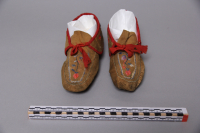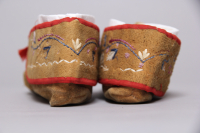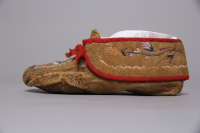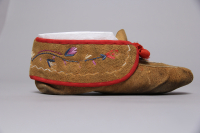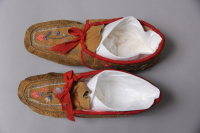moccasins
moccasins
moccasins
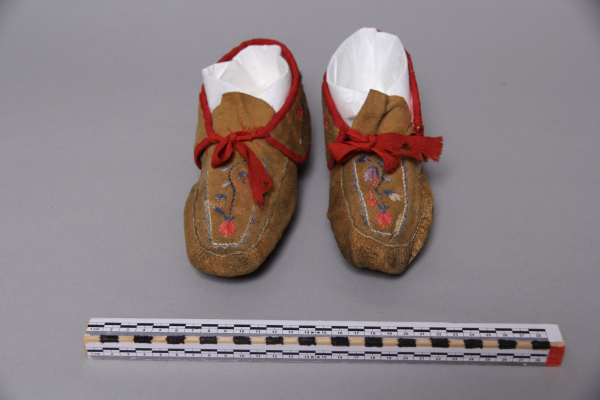
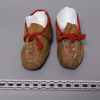
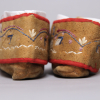
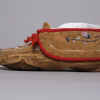
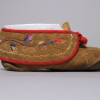
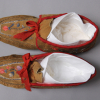
A pair of late 19th century Huron-Wendat moccasins with moosehair embroidery featuring floral motifs and zig-zag lines on the separate cuff and puckered toe vamp. Likely made for the tourist market, these moccasins were collected by Herman ten Kate and purchased from him by the museum in 1921.
Museum documentation, publication information
Museum documentation, GRASAC generated
Read More About This Relative
possibly commercially(?) tanned hide; pink glazed cotton; red cotton; red fabric ribbon; moosehair, natural and dyed pink, blue, purple; thread; light brown string
Pair of moccasins made of possibly commercially tanned hide, with tightly puckered toe vamps that are decorated with moosehair embroidery. The vamps are long and narrow, and extend to form a tongue. The separate cuffs are bound with red cotton and a cuff on one moccasin is laced together with a brown string. Red fabric ribbon sewn to the cuffs is tied across the front of the ankle. Moccasins are lined with pink glazed cotton.
Floral motifs with U-shaped embroidered curve of a white line and blue zig-zags on the vamp. Floral motifs and a white zig-zag line along the side and bottom of the cuffs.
"[This pair of moccasins] in the ten Kate collection are examples of the mass production of moccasins developed four the tourist market by Wendat entrepreneurs toward the end of the nineteenth century. By this period the loss of hunting lands and native-tanned hides had caused the Wendat and Hodenosaunee to use commercially processed hide, although they turned the untanned surface to the outside in order to more closely imitate the appearance of native-tanned hide [...] The moosehair embroidered floral designs on the vamps and cuffs of ten Kate's moccasins are much simplified from those at Lorette fifty years earlier. [...] This tourist-style Indian footwear was sold for practical purposes, to be used as slippers, and also as a collectable souvenir." (Pieter Hovens, with contributions by Duane Anderson, Ted Brasser, Laura van Broekhoven et al. "The Ten Kate Collection 1882-1888". Leiden: ZKF Publishers, 2010, pp 25)
Museum documentation
Provenance
Collected by Herman ten Kate, purchased from him by the museum in 1921
Pieter Hovens, with contributions by Duane Anderson, Ted Brasser, Laura van Broekhoven et al. "The Ten Kate Collection 1882-1888". Leiden: ZKF Publishers, 2010
 Knowledge Sharing Platform
Knowledge Sharing Platform

